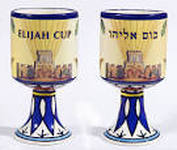 With Passover quickly approaching, it seems like a good time for an Elijah story. This is a well known one that I made some minor edits to. Do you have a story or poem that you are planning on telling at your seder? If yes, please share. Once in a long ago faraway place, there lived a man who was old, blind, penniless, and childless. Even though there were so many troubles in his life, he was able to get by with joy in his heart, for he had the love of a sweet and kind wife. They had so little, but they were rich in the love they shared for each other. And whatever little they had, they would gladly share with others. One day the man just needed the time and space to think about things. He never complained, but he needed to go somewhere and reflect on his life. He made his way down to the river bank and began to think of all that had happened to him and how things could have been different. He was lost in thought when suddenly he heard something in the distance. It was the tap, tap, tap think of a cane coming closer and closer. There was the rustling of a long satin cloak. He smelled an aroma that reminded him of scents so sweet, they might have been in the Garden of Eden. Someone came and sat beside him, saying "Do you know who I am?" The old man thought of the sounds and the scent. "Are you... You must be Elijah the prophet!" "Yes, you are right. I am Elijah, and I have been sent here for a very special reason. God has looked here and has seen your suffering. Yet you do not complain; you are still grateful for life, and you and your dear wife share much joy. And, too, you are always ready to share with those less fortunate than yourselves. So I have been sent here to bring you a message. You will be granted a wish! What shall it be? What is it that you want?" The old man did not move. He stayed very still, very quiet, thinking. What wish should he make? What did he really want? Should he wish for his sight? His youth? Money? Dare he wish for a child? Try as he might, he just couldn't make up his mind. Finally Elijah spoke again. "I can see that this is a difficult decision, one not easily made. So why not think about it for a while? Go home and consider what you will do. And then I will meet you here tomorrow, same time and same place. You can tell me then what you will wish." Then the old man heard the rustling of the long satin cloak as Elijah rose to go. He heard the tap, tap, tapping of the cane going off into the distance. But the smell, like all the scents in the Garden of Eden... that scent lingered long after. The old man stay by the river, listening to the water gently flowing by. After a while the old man slowly made his way back home. "Wife! Beloved wife! Come and hear of my adventure!" Call the old man as he entered their house. And he told his wife the whole story. When he got to the end of his tale, he asked, "Please help me. What one wish can I make?" "Do not worry my wonderful husband. All will be for the best. For now, it is time for dinner. Sit down, have some soup and good bread. After dinner, we can rest and tell each other stories. Go to sleep tonight and have some sweet dreams, and tomorrow we will decide what you should say." And that is exactly what the loving couple did. The man had the most beautiful dreams all night long, and in the morning, after breakfast, his wife whispered something in his ear. "Oh, my sweet wife! What a treasure I have in you! That is exactly the right wish. Now, if only I can remember!" Repeating the wish to himself, the old man left his house and made his way slowly back to his place by the river and began to wait. And he waited and waited, listening for the sounds that he had heard the day before. Soon enough, the old man heard it: the tap, tap, tapping of a cane coming closer and closer. There was the rustling of a long satin cloak, and then, finally, there was yhr smell like every scent in all of the Garden of Eden. And Elijah the Prophet came and sat down next to the old man. "Shalom aleichem.” “Aleichem shalom.” "Well now it is time. I can grant only one wish for you. What will that be?" What should he wish for? A child? Money? His sight? His youth? His health? The old man hesitated for a moment. He took a deep breath, and he began: "May I live...see the day.. when my child.. will eat.. from a golden plate!" Elijah threw back his head and began to laugh and laugh. "I can see that you've managed to get all of your wishes into one wish! I'll bet that God is enjoying this just as much as I am. And I am certain that God will see to it that every part of your beautiful wish is granted." For a moment, all was still and silent. Then the old man heard the rustling of the long satin cloak and the tap, tap, tapping of the cane going off into the distance. But the smell, like every scent in the Garden of Eden, that sweet lingered long into the afternoon... And it has been told that the old man and his sweet wife and their lovely child lived a peaceful and joy-filled life together for many, many years. So may it be for us all. Amen. ********************* Story told by Cherie Karo Schwartz in her wonderful book Circle Spinning. From her notes, Pg 28: Adaptation of folktale from the Israel Folktale Archives. English version in Gates to the New City, edited by Howard Schwartz. ********************* Reb Levi Yitzchak of Berditchev tz"l used to wish everyone "a kosheren Purim" and a "freiliche Pesach". Of course everyone else usually says the opposite: "a freiliche Purim- a happy Purim" and "a kosheren Pessach-a kosher Pessach". Of course someone asked him to explain why was he reversing the blessings? And so he explained: '"Everyone knows that on Purim you have to be happy and to be sure we are even obligated to get drunk, but in the midst of the Purim festivities someone might forget that Purim also has to be kosher - hence he would wish all 'a kosheren Purim'; Pesach on the other hand, everyone is so busy cleaning and getting rid of their 'chametz', which is a very strict mitzvah in the Torah, and in the process some may forget the mitzvah of 'v'samachtah b'chagechga' - you shall rejoice in your holiday - hence he would wish everyone a "freilichen Pessach". So ...let's bless one another with "A KOSHEREN UN FREILICHEN PESACH!" ********************* Please consider offering a tax deductible donation to support this project and the work of DC's Jewish Renewal community Minyan Oneg Shabbat. Thank you.
0 Comments
 It was a few days before Pesach. Everybody in town, including the Brisker Rav, Rabbi Yosef Dov Seloveitchik, was preparing for the holiday. Not a crumb of chametz could be found anywhere. That evening, a stranger knocked on the Brisker Rav’s door. “I need to ask the rabbi a question. Am I allowed to use milk instead of wine for the four cups at the Seder?” he asked. The Brisker Rav looked concerned and replied, "I am the Rav. Tell me sir, are you sick? Are you not able to drink wine?” “No, I am fine, thank you,” the stranger offered. But then his face fell. The Rav asked again, "Are you sure that you are alright?" As he finished asking this question, his wife hurried into the room and handed the man 10 rubles. Wait,” the man stammered. “I didn’t come here for charity. I just came to ask the Rabbi a question.” “But this is not charity,” she explained, "I couldn’t help overhearing your problem. Just this morning a rich man came and gave us money, and asked us to give it to the person who asked the most insightful question concerning Passover preparations. You would really be doing me a tremendous favor, since I don’t have much time left to give out this gift that was given to me to give. I’m very busy preparing for the holiday. Please help me by accepting it – I’m not sure I’ll have another chance to dispense it,” Overcome with joy and gratitude, the stranger thanked them both, and left. As soon as he was gone, the Rav looked at his wife. “I appreciate that you wanted to help, but I don’t understand why you gave that man so much money. Even the best wine doesn’t cost more than 2 rubles– and what was the story you told him about the rich man?” “ Didn’t you hear what he asked?” replied his wife. “If he was planning to use milk at the Seder, surely he doesn’t have the money to buy meat.,He probably doesn’t have enough money to buy all the other things for the Seder either. Even though he didn’t want charity, I gave him enough money to buy food for his family. And he would not have taken it, except that I told him he would be doing it as a favor to me.” And with that, Reb Yosef Dov and his wife returned to their Pesach preparations. Story re-crafted by R' Mark and Renée Brachfeld ************ Reb Levi Yitzchak of Berditchev ztz"l used to wish everyone "a kosheren Purim" and a "freiliche Pesach". Of course everyone else usually says the opposite: "a freiliche Purim- a happy Purim" and "a kosheren Pessach-a kosher Pessach". Someone asked Reb Levi Yitzchak to explain why was he reversing the blessings? And so he explained: "everyone knows that on Purim you have to be happy and to be sure we are even obligated to get drunk, but in the midst of the Purim festivities someone might forget that Purim also has to be kosher" - hence he would wish all "a kosheren Purim; "Pesach on the other hand, everyone is so busy cleaning and getting rid of their 'chametz', which is a very strict mitzvah in the Torah, and in the process some may forget the mitzvah of "v'samachtah b'chagechga" - you shall rejoice in your holiday - hence he would wish everyone a "freilichen Pessach". So ...let's bless one another with "A KOSHEREN UN FREILICHEN PESACH!" ************ Please consider offering a tax deductible donation to support this project and the work of DC's Jewish Renewal community Minyan Oneg Shabbat. Thank you.  One day a poor man showed up at a local banquet. Everyone of means in the community had been invited, but this man, dressed in rags, had not. The banquet was already underway when the poor man entered and made his way into the grand home of one of the local merchants. The servants gazed upon the man with a look of reproof, not believing that someone dressed so shabbily would dare show up at such an event. They hastily escorted him to the farthest corner of the great room in which the banquet was being held. From that vantage point the poor man watched as great trays of food were passed around, none of which were offered to him. And so it was that while everyone else ate and drank, the poor man sat, quietly taking in all of the proceedings. After some time had passed the poor man got up from his seat and exited. He proceeded to borrow a beautiful set of finery - a proper set of clothes - and returned to the banquet, dressed much differently than he had before. The servants welcomed the well dressed man, and shaking his hand vigorously, invited him to take a seat at the head table where the owner of the house sat. The poor man was immediately offered trays and platters overflowing with delicious food, as well as drink to match. Without hesitation the poor man stood up from his seat, grabbed a handful of food and began stuffing it into his clothes - first a turkey leg into his right pocket, then piles of potatoes into his arm sleeves, and finally apples and pears under his shirt - all the while yelling, “Eat coat, eat!” The guests were aghast, and watched as the poor man continued on. The master of the house rose from his seat, and in a raised voice shouted, “Excuse me sir, what exactly are you doing?” The poor man paused, turned to him, and replied, “Well sir, it was clear when I arrived earlier dressed in rags, that I was not welcome here. It was only when I returned dressed as I am now that food and drink were generously offered to me. What is clear is that it is not me that is welcome to this fine banquet, but rather my coat that is welcome. And so, should my coat not eat?” Story re-crafted by R' Mark Novak & Renée Brachfeld Origin unknown (Any suggestions as to how the poor man acquired the set of fine clothing?) ************************** Please consider offering a tax deductible donation to support this project and the work of DC's Jewish Renewal community Minyan Oneg Shabbat. If you would like to be added to the growing list of "Year of Stories" followers, let me know at [email protected], with "Year of Stories" in the subject line.  It's Adar, and I just can't resist including this well known, but still funny tale. I dedicate it not only to my Rebbe, but to my daughter Kaziah as well, a member of the Mt. Holyoke varsity equestrian team. Marbim b'simcha everyone! If you've got a good one for Adar, please pass it on below in the comments section. This is a story about a Jewish guy who buys a horse. The fellow who sells it to him tells him, "This horse is different than other horses – it is trained to start moving when you say “Baruch Hashem” (Thank G!d), and he's trained to stop only when you say “Shma Yisrael” (Hear Oh Israel)
The new owner is all excited with his new purchase and gets on the horse and practices. “Baruch Hashem” he says, and the horse breaks into a trot. The man is delighted, and a few moments later calls out “Shma Yisrael”, and sure enough, the horse stops. "Wow, this is great", the man laughs, "it's a Jewish horse!" And so it was that some days later, while galloping on his horse through the forest and having the time of his life, he sees in the distance that the path ahead ends at a steep cliff. His heart begins to race, when suddenly he realizes that he has forgotten the two-word formula needed to make the horse stop! "It's a well known expression", he says to himself. "What is it, what is it?" In confusion he shouts, "Shabbat shalom!" The horse keeps going. "Adon Olam!" he cries out. The horse keeps going, faster still to the abyss. In near desparation he wails “B'vak'asha!”. But the horse keeps galloping. Realizing that he is about to die, he does what any Jew would do when confronted with certain death. He screams out, “Shma Yisrael!”. And as trained, the horse stops suddenly – barely a foot from the edge of the cliff. Shaking like a leaf, he pulls out his handkerchief and wipes the sweat from his forehead. “Whew" he exhales, "Baruch Hashem!" ************ Please consider offering a tax deductible donation to support this project and the work of DC's Jewish Renewal community Minyan Oneg Shabbat. If you would like to be added to the growing list of "Year of Stories" followers, let me know at [email protected], with "Year of Stories" in the subject line.  My friend and colleague R' Leila Gal Berner shared this sweet story with me. R' Zalman tz"l brought so much joy to so many of us, what more fitting way to enter into the month of Adar. מרבים בשמחה Marbim B'simcha! May Our Joy Increase! When I was a student at the Reconstructionist Rabbinical College, I had the honor of spending a fair amount of time learning with Reb Zalman at the P’nai Or house on Emlen Street. During that time, Zalman and I would take walks in the neighborhood. Since Mt. Airy is an old neighborhood, the sidewalks were very uneven and it was always necessary to look down when walking in order not to trip and fall flat on one’s face. Simply strolling was impossible.
One day, walking and gazing down at the sidewalk carefully, Reb Zalman spotted a centipede. Bending down, he gently scooped the centipede up and placed it on his arm. As it undulated up and down Zalman’s arm, my rebbe spoke quietly, “Baruch HaShem, Leila leybn, that we can gain such wisdom from this little creature! Look at its many legs. You know, we are like the centipede. We each walk on hundreds of feet and it is only somewhere in our lives that we discover our genuine two feet. All the others feel inauthentic, unreal, like marshmallows, like pillows. We don’t really feel anything beneath our feet and we aren’t really connected to the vitality of the earth beneath them. But when we discover our ‘real’ feet, we begin to feel deeply connected to holy ground, just as Moshe Rabbeinu felt before the burning bush. With our real feet, we feel heat and cold, and pain. We feel softness and harshness, and sharpness — we feel Life! Make sure, Leila leybn, that you find your authentic feet and walk honestly and humbly on them. Years later, I reminded Reb Zalman of his words about the centipede. My rebbe smiled and simply asked me, “So, nu, have you found your feet yet?” When I answered that I thought so, he laughed and said, “Baruch HaShem.” Thank you Leila for sharing this with us. If you have a story or comment to share, please do so by clicking on the Comments section below ************ Please consider offering a tax deductible donation to support this project and the work of DC's Jewish Renewal community Minyan Oneg Shabbat. If you would like to be added to the growing list of "Year of Stories" followers, let me know at [email protected], with "Year of Stories" in the subject line. 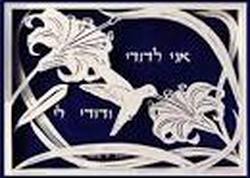 I served as shaliach tzibbur this morning at Tiferet Israel in northwest DC. In my usual playful manner of acknowledging (nearly) all things, I overlaid the love song • L-O-V-E • while I chanted the paragraph that begins with Kulam Ahuvim, all are beloved. Much to my delight, this being Valentine's Day, the drash given by TI member Iris Lav was dedicated to love, especially of the romantic kind, not a frequent topic for the either the Torah or for Chazal. Iris presented three stories, two from the Talmud and the other from the commentary to Shir haShirim, the Song of Songs. I plan to use all of these stories in my meeting tomorrow with a lovely couple who are getting married in June. All three stories are worth mining for their deeper meaning. I'd love (pun intended) to hear your take on any of the stories. So if that is your desire (what, another pun?) please comment below. I added Hebrew below in places where there is a likely play on words. • From Babylonian Talmud Bavli 62b Rav Rehumi (רב רחומי) used to learn in Rava's yeshiva in the town of Mahoza. He was accustomed to coming home every Yom Kippur eve. One day he lost himself in his learning. His wife was awaiting him: "Now he's coming, now he's coming,"she thought. He did not come. She grew weak. She let a tear (אחית) fall from her eye. At that moment Rav Rehumi was sitting on the roof. The roof collapsed (אפחית) underneath him. And he fell to his death. (Go back and re-read A Year of Stories #30. Are these two stories related in their underlying message?) Translation from Ruth Calderon, A Bride for One Night • from Shir haShirim Rabah 1:31 (In Babylon) it was taught: If a man has taken a wife and lived with her for ten years, but she has not borne a child, he is nonetheless obligated (to "be fruitful and multiply," and therefore to marry another woman.) R' Idi said: The story is told of a woman from Sidon who lived with her husband for ten years and did not have children. They came before R' Shimon ben Yochai and asked to be divorced from one another. He said to them: "Look here, as you married each other with food and drink, so too may you separate only with food and drink." They went on their way, and made a holiday for themselves. They made a great feast, and she got him too drunk. This brought him back to his senses, and he said to her: "My beloved, if you see anything that you want in my house... ראי כל חפץ טוב שיש לי בבית ...take it and go to your father's." What did she do? After he fell asleep, she called to her servants, saying, "Carry him in his bed to my father's house." At midnight, when the effects of the wine had worn off, he awoke, and said to her,"My beloved, where am I?" She said to him: "In my father's house." He said to her: "What am I doing in your father's house?" She said to him: "Is that not what you said to me last evening, "anything you desire in my house take it and go to your father's house"? There is nothing I desire more in the world than you!" אין חפץ טוב לי בעולם יותר ממך They went before R' Shimon ben Yochai, and he stood and prayed over them, and they had children. (Translation from Ido Hevroni, Midrash As Marriage Guide • Babylonian Talmud Nedarim 66b A son of Babylon went to the land of Israel and took a wife. He said to her: "Cook me a couple of lentils." She cooked him two lentils. He was angry with her. The next day, he said to her, "Cook me a se'ah of lentils (approximately 14 liters). She cooked him a se'ah of lentils. He said to her: Go and bring me two botzinei (can mean either pumpkins or oil lamps) She brought him two oil lamps. He said to her: "Go and break them against the head of the baba (gate) Baba ben Buta was sitting at the city gate and giving judgment. She went and broke them on his head, He said to her, "What have you done?" She said to him, "What my husband bade me to do." He said, "Because you did your husband's bidding, G!d will give you two sons like Baba ben Buta." (translation from Ido Hevroni, The Midrash as Marriage Guide) ************ Please consider offering a tax deductible donation to support this project and the work of DC's Jewish Renewal community Minyan Oneg Shabbat. If you would like to be added to the growing list of "Year of Stories" followers, let me know at [email protected], with "Year of Stories" in the subject line.  When Rabbi DovBer of Lubavitch was a young man, he lived in the same house as his father, Rabbi Schneur Zalman. R’ DovBer and his family lived in the ground floor apartment, and his father R’ Schneur Zalman and mother Sterna lived on the second floor. One night, while R’ DovBer was deeply engrossed in meditation, his youngest child fell out of his cradle. R’ DovBer heard nothing. But his father, R’ Schneur Zalman, who was also immersed in study in his room on the second floor, heard the infant's cries. The Rebbe came downstairs, lifted the infant from the floor, soothed his tears, replaced him in the cradle, and rocked him to sleep. The father said to his son, “ if you are studying so intensely that you can’t hear your own child crying, than you are not meditating.” ************* Adapted by R' Mark Novak, from versions told by R’ David Ingber in a drash on Parshat Mishpatim (here) and R' Yanki Tauber. Rabbi Tauber's version extracts further meaning from Deuteronomy 22:1-3, which ends with the words לא תוכל להתעלם (lo tu'chal l'hit'a'leym) you must not hide yourself. ************ Please consider offering a tax deductible donation to support this project and the work of DC's Jewish Renewal community Minyan Oneg Shabbat. If you would like to be added to the growing list of "Year of Stories" followers, let me know at [email protected], with "Year of Stories" in the subject line.  And here are two Sufi stories to demonstrate just that The Sun & The Cave One day the sun and a cave struck up a conversation. The sun had trouble understanding what “dark” and “dank” meant and the cave didn’t quite get the hang of “light and clear” so they decided to change places. The cave went up to the sun and said, “Ah, I see, this is beyond wonderful. Now come down and see where I have been living.” The sun went down to the cave and said, “Gee, I don’t see any difference.” The Dream A visitor came to a Chishti pir. This visitor wanted to demonstrate his own knowledge of the Qur’an and intended to overpower the Chishti pir in a debate. When he entered, the Chishti pir took the initiative however and mentioned Yusuf and the dreams he has had according to the Qur’an. He then suddenly turned to his visitor and asked him if he could tell him about a dream, so that the visitor may give his interpretation thereof. After receiving permission the Sufi told that he has had a dream and both of them were in it. The Chishti pir then went on by describing the following dream event: “I saw your hand immersed in a jar of honey, while my hand was immersed in the latrine”. The visitor hastened to interpret: “It is quite obvious! You are immersed in wrong pursuits whereas I am leading a righteous life”. “But’, the Sufi said, “there is more to the dream”. The visitor asked him to continue. The Chishti pir then went on by telling this: “You were licking my hand and I was licking yours”. ********************* I found both these stories at http://theunboundedspirit.com/10-sufi-stories/#sthash.fmZpj63J.dpuf ********************* Please consider offering a tax deductible donation to support this project and the work of DC's Jewish Renewal community Minyan Oneg Shabbat. If you would like to be added to the growing list of "Year of Stories" followers, let me know at [email protected], with "Year of Stories" in the subject line.  A delicious story for your Tu b'Shvat gala (puns intended) In a great oak forest where the trees grew tall and majestic, there was a little apple tree. It was the only apple tree in the forest and so it stood alone. Winter came. As the snow fell to the forest floor, it covered the branches of the little apple tree. The forest was quiet and peaceful. One night the little apple tree looked up at the sky and saw a wonderful site. Between the branchesof all the trees, the little apple tree saw the stars in the sky, which appeared to be hanging on the branches of the oak trees. "Oh God oh God," whispered a little apple tree, "how lucky those oak trees are to have such beautiful stars hanging on their branches. I want more than anything in the world to have stars of my branches, just like the oak trees have! Then I would feel truly special! God looked down the little apple tree and said gently, "Have patience! Have patience little apple tree!" Time passed. The snows melted and spring came to the land. Tiny white and pink apple blossoms appeared on the branches of the little apple tree. Birds came to rest on its branches. People walked by the little apple tree and admired it's beautiful blossoms. All summer long, the apple tree continued to grow. The branches of the tree formed a canopy overhead as they filled with leaves and blossoms. But night after night, the little apple tree looked up at the sky with the millions, and millions, and millions - and millions of stars and cried out, "Oh God, I want more than anything in the world to have stars in my tree and on my branches and in my leaves - just like those oak trees." And God looked down at the little apple tree and said, "You already have gifts. Isn't it enough to have shade to offer people, and fragrant blossoms, and branches for birds to nest on so they can sing their song?" The apple tree sighed and answered simply, "Dear God, I don't mean to sound ungrateful, but that is not special enough! I do appreciate how much pleasure I give to others, but what I really want more than anything in the world is to have stars, not blossoms, on my branches that I would feel truly special!" God smiled and answered, "Be patient little apple tree." The seasons changed again. Soon the apple tree was filled with many beautiful apples. People walked in the forest. Whoever saw the apple tree would reach up to pick an apple and eat it. And still, when night came to the forest, the apple tree look at the stars in the oak trees and called out, "Oh God, I want more than anything in the world to have stars in my branches! Then I would feel truly special." And God asked, "But apple tree, isn't it enough that you now have such beautiful apples to offer people? Does that satisfy you? Does that give you enough pleasure and make you feel special? Without saying a word, the apple tree answered by shaking its bracnches from side to side. At that moment, God caused a wind to blow. The great oak trees began to sway and the apple tree began to shake. From the top of the apple tree an apple fell. When it hit the ground, it split open "Look," commanded God, "look inside yourself. What do you see?" The little apple tree looked down and saw that right in the middle of the apple - was a star. And the apple tree answered, "A star! I have a star!" And God laughed a gentlelaugh and added, "So you do have stars on your branches. They've been there all along, you just didn't know it." (Origin unknown. Re-crafted by Peninnah Schram and Rachayl Eckstein Davis in The Chosen Tales) 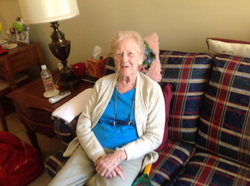 My mother, Elsie Novak, died on November 6. May her memory be for a blessing My mother, Elsie Novak, died on November 6. May her memory be for a blessing I recall times when as I child I lay sick in bed. My mother would gently rub Vick's VapoRub on my chest, and then cover it with a dry wash cloth. So warm, so soothing, so mentholated. Even now I can feel my mother's hand doing its magic. And when I look at my hands, I see hers - freckled, thin, and yes, aging. If only my hands could pass on comfort as my mother's did. This story took place in the north of Lebanon in the village of Hamadin. And the happening, as told, goes like this: In the village lived a widow and her beautiful daughter, an only child. One day the daughter became ill and was ordered to rest. And so she lay on her bed near the window and looked out at the only tree in the yard. Thus, days, weeks, and months passed, and the autumn came. But the girl's condition didn't improve. On the contrary, she grew worse. And so, one day, as she looked at the tree, she said weakly, "You see, Mother, see those leaves. When the last leaf falls, I will die." The mother's heart grieved, and she watched anxiously as the leaves fell. One cold night the wind howled, and the mother's heart was full of despair, as she saw the wind taking the last leaves. With every leaf her heart sank even deeper. At last there was only one leaf left. What could she do? So the poor woman ran outside, unaware of the cold, the gusts of wind, and the storm. She approached the wall in front of the tree, and there she painted, on the wall, a picture of the last leaf. So good, so accurate was the drawing, that it looked like the last leaf itself. When the girl awoke, she looked out the window, and there she saw one lonely leaf. Days and weeks passed. From time to time she looked out, amd always she saw that last leaf, still hanging on the branch of the tree, A new spirit entered the girl. Slowly, slowly she recovered, and at last she got well. But the mother, by going out on that windy night, had caught cold. She developed tuberculosis, and soon died. When the girl was able to leave her bed, she went outside to see the miracle that had occured: Why had that leaf not fallen? And what did she see? The painting, done by her mother, which had cost her her life for her child's sake. Then the girl realized her mother's great love, and grieved greatly for her mother who, in her own death, had given life to her. The Mother, a Lebanese Folktale, retold by Barbara Rush, from The Jewish Spirit: A Celebration in Stories & Art ººººººººººººººººººººººººººººº
My late rebbe, R' Zalman Schachter-Shalomi, zt"l, (זכר צדיק לברכה) was a master storyteller. He taught, in the name of Abraham Joshua Heschel zt"l: "a mayse is a story in which the soul surprises the mind". "A Year of Stories" is dedicated to his memory. I invite you to forward the link to these stories so that they find their way into the hearts of other listeners and tellers. ∞∞∞∞∞∞∞∞∞∞∞∞∞∞∞∞∞ Please consider offering a tax deductible donation to support this project and the work of DC's Jewish Renewal community Minyan Oneg Shabbat. If you would like to be added to the growing list of "Year of Stories" followers, let me know at [email protected], with "Year of Stories" in the subject line.  This Thursday I head off to Ohalah, what my wife Renée refers to as "a rabbis convention for unconventional rabbis." This will be the first such gathering since the death of Reb Zalman, tz"l, and will then take on special meaning. This post, A Year of Stories #26, marks the 1/2 year since his death on July 3. A few days ago I received in the mail a hardcover copy of Rebbe, the biography of Reb Menachem Schneerson written by Joseph Telushkin. I had not ordered it, so you can imagine my surprise when I discovered a note inside explaining that it was a gift to me from a pair of philantropists who had underwritten the mailing. Wow, that's a lot of bucks - "gimme loot, chasadim!" I immediately looked in the index for Reb Zalman's name, and of course, found a good number of references to him, as he was a musmach (he had been ordained) by the Central Lubavich Yeshiva in 1947. Through the subsequent years Reb Zalman had many interactions with the person who R' Telushkin calls "the most influential rabbi in modern history." Here is a story that Reb Zalman shared with the author about his Rebbe: When Rabbi Zalman Schacter-Shalomi was Hillel director at the University of Manitoba in Winnepeg, Canad, he brought a group of students to meet with the Rebbe in Brooklin. At the conclusion of the rebbe's opening remaks, one of the students, intending to be blunt rather than disrespectful, asked him, "What's a Rebbe good for?" To this day Reb Zalman remembers his feelings at that moment: "I could have sunk through the floor in embarassment." However, the Rebbe didn't seem offended at all and responded to the query directly: "I can't speak about myself, but I can tell you about my own Rebbe (his father in law). For me, my Rebbe was the geologist of the soul. You see, there are so many treasures in the earth. There is gold, there is silver, and there are diamonds. Bit if you don't know where to dig, you'll only find dirt and rocks, and mud. The Rebbe can tell you where to dig, and what to dig for, but the digging you must do for yourself." from Rebbe, by Joseph Telushkin, Pg 209 also, see Reb Zalman's book The Geologist of the Soul: Talks on Rebbe-Craft and Spiritual Leadership ººººººººººººººººººººººººººººº My late rebbe, R' Zalman Schachter-Shalomi, zt"l, (זכר צדיק לברכה) was a master storyteller. He taught, in the name of Abraham Joshua Heschel zt"l: "a mayse is a story in which the soul surprises the mind". "A Year of Stories" is dedicated to his memory. I invite you to forward the link to these stories so that they find their way into the hearts of other listeners and tellers. ∞∞∞∞∞∞∞∞∞∞∞∞∞∞∞∞∞ Please consider offering a tax deductible donation to support this project and the work of DC's Jewish Renewal community Minyan Oneg Shabbat. If you would like to be added to the growing list of "Year of Stories" followers, let me know at [email protected], with "Year of Stories" in the subject line. 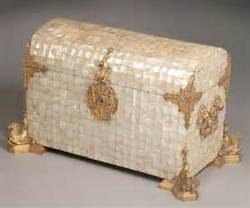 Some stories are just plain puzzling, disturbing, or head scratching, with an easy way in but no easy way out. As we head into 2015, I offer you one of those stories, from Tales of the Dervishes by Idries Shah, Pg. 31. Nuri Bey was a reflective and respected Albanian, who had married a wife much younger than himself. One evening when he had returned home earlier than usual, a faithful servant came to him and said: "Your wife, is acting suspiciously. She is in her apartment with a huge chest, large enough to hold a man, which belonged to your grandmother. It should contain only a few ancient embroideries. I believe that there may now be much more in it. She will not allow me, your oldest retainer, to look inside." Nuri went to his wife's room, and found her sitting disconsolately beside the massive wooden box. "Will you show me what is in the chest?" he asked. "Because of the suspicion of a servant, or because you do not trust me?" "Would it not be easier to just open it, without thinking about the undertones?" asked Nuri. "I do not think it is possible." "Is it locked?" "Yes." "Where is the key?" She held it up, "Dismiss the servant and I will give it to you." The servant was dismissed. The woman handed over the key and herself withdrew, obviously troubled in mind. Nuri Bey thought for a long time. Then he called four gardeners from his estate. Together they carried the chest by night unopened to a distant part of the grounds and buried it. The matter was never referred to again. (Idries Shah's notes follow the story: This tantalizing story is part of the repertoire of wandering (Kalandar) dervishes, whose patron saint is the 13th century Yusuf of Andulusia.)  This Tuesday I am heading off to attend a silent meditation retreat led by my friend and colleague Rabbi James Jacobsen-Maisels. Years ago this song, Silence, was literally "delivered" to me in whole from somewhere beyond my conscious mind. The song itself is a meditation, and I invite you to close your eyes, breath slowly and deeply, and receive it as I did, in quiet contemplation. Blessings for a light-filled Hanukkah. Silence
Music/Lyrics Mark Novak and angelic shlichim Once upon a time there was the silence Hope was still a memory of future days ahead The waters parted company in silence And heaven kissed the earth so softly snuggled in her bed. The quiet desert moon reflects the silence Stories of the stars are heard in whispers over time Remember how we captured life in silence Drifting off to sleep to images and rhymes. Talking is more often done in silence The thoughts between the lines speak louder than our words Embarrassingly adolescent silence Truth is left unspoken, trembling like a bird. I recall in refuge I took silent So I could hear the beating of my heart reveal my name Where myth is woven peacefully in silence Eyes meet eyes meet ancient eyes - come dance before the flame G!d is resting comfortably in silence. Patiently he waits for us - take comfort, let him in Beauty is revealed to us in silence Returns us to the place where we can all renew again In Silence Silence Silence. ººººººººººººººººººººººººººººº My late rebbe, R' Zalman Schachter-Shalomi, zt"l, (זכר צדיק לברכה) was a master storyteller. He taught, in the name of Abraham Joshua Heschel zt"l: "a mayse is a story in which the soul surprises the mind". "A Year of Stories" is dedicated to his memory. I invite you to forward the link to these stories so that they find their way into the hearts of other listeners and tellers. ∞∞∞∞∞∞∞∞∞∞∞∞∞∞∞∞∞ If you would like to be added to the growing list of "Year of Stories" followers, let me know at [email protected], with "Year of Stories" in the subject line. 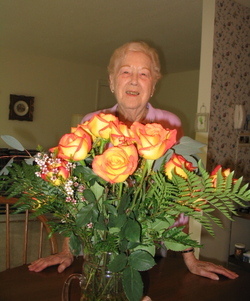 Shloshim is the number 30 in Hebrew, and this past Tuesday morning, immediately following Shacharit, the morning prayers, marked 30 days since my mother Elsie's burial. I have been going to synagogue daily to davven and to say Kaddish for her. When the moment arrives to stand and remember, the service leader asks everyone to share the name of the person whom s/he is saying Kaddish for. I say, "My mother, Elsie Novak, Osnat bat Moshe Bayer haCohen v'Nachuma." The mourners and those observing yahrtzeit proceed to say the words together, the text of the Jewish mantra which dating back to the 1st C BCE, words which serve to sanctify all life, as we gently guide the soul of our loved ones back to their source. While saying Kaddish last night I began to cry. The tears came not from immediacy of my mother's death, that has subsided with time, but rather from a fear that after only 30 days the recitation of the Kaddish was already feeling somewhat rote, routine, and G!d forbid, mundane. I don't want my remembering to become distracted habit, I want it to stay fresh and vibrant and heart-opening. How had 30 days had passed so quickly? The truth of that saddened me. The text of the Kaddish is engraved in me. I do not need to read it from the siddur. יהא שמה רבא מברך... With my hands free my mind began to wander. I heard the echo of a word that my mother used to use: PLICHING When it was raining very, very hard, my mother would say that "it's pliching out." I never had had any impulse to research the origin of the word, but during shiva, when many things have time to surface, I took the opportunity to pick up my English-Yiddish dictionary, and sure enough, there it was: פליוכרעגן (someone please help me with the pronunciation here). I smiled, and acknowledged that it had taken me all of my life to look up the word that my mother used so often. Why had it taken until now? More tears welled up. The Kaddish continued, לעלא מן כל ברכתא ושירתא Another word arose in my consciousness, KAMMONDAVING. My mom used this word to mean making a racket, or commotion, as in "Who needs all that kammondaving around the house." I was less successful finding any origin of this word in the dictionary. Perhaps my mother had made it up? The sense of the word did play a role before shiva started. I had decided that although I would let my various communities know of my loss, I was not going to advertise the times that we would be sitting shiva. I don't like the vibe after prayer, which more often than not turns into a loud social gathering as opposed to being in a house of mourning. I questioned my decision not to make the times public, but at one point realized, "That's my mother! She wouldn't have liked all the kammondaving in the house." Another way that my mother lives on through me. I have 10 months left to say Kaddish for my mom. The ritual will take me through the winter, spring, summer, and fall; through the entire year's cycle of holidays; through planting and tending and reaping and finally again laying to rest my beloved garden; through watching the budding of our lilac tree, until it flowers, when I will bend a branch to my nose, a havdalah moment, and I will gather in my mother's favorite fragrance. I will then say out loud, "Hello Mamale"; through another baseball season where every batter's intention is to circle the bases and return home. עשה שלום במרומיו הוא יעשה שלום... I wipe the tears from my eyes, and a sense of peace comes over me. Death, burial, shiva, shloshim; minyan, kaddish, breathe. אמן Amen  Minyan Oneg Shabbat has been offered a Matching Grant up to $1500. As of 12/11 only $418 more to raise by 12/31! Please consider offering a tax deductible donation of $18 or more to support this project and the work of DC's Jewish Renewal community Minyan Oneg Shabbat. All proceeds go to providing us with rental space and the ability to dream a little bigger. Ah, all those Greek gods to bow down to. Next month many of my colleagues and I will be gathering in a hotel outside of Boulder, Colorado for Ohalla, what my wife Renée calls a "rabbinic convention for unconventional rabbis". Years ago at the Tuesday night cabaret I, along with three others I will refer to as my "crew", perfomed a rap about Shabbat. Reb Zalman sat watching, totally perplexed, and at one point during the rap I jokingly feared for my future, saying, "I can see my teudah (ordination document) going up in flames as I speak." Lucky for me, Reb Zalman liked my davvening and storytelling! If you like the rap and you'd like a copy, it's available on iTunes for 99 cents. What a deal! Lyrics below. Enjoy! If You’re A Maccabbee (Hanukkah Rap) Music & Lyrics by Mark Novak
Let me tell you a story about days of old When the nights were long and the days were cold Alexander the Great was the king you see Of the land of Judea where the Jews were free To live and worship the only God Adonai Eloheynu Adonai Echad Now Alexander the Great despite his royal fame Grew old and died, ending his reign A new king arrived upon the scene A real pain in the tuchus, if you know what I mean He gathered together all of the Jews and said “Listen closely ‘cause I got bad news.” Now this King Antiochus, he thought he was wise He said, “You can’t observe Shabbat or be circumcised You have to pray to great Greek Gods Israel And sacrifice pigs - they squeal!” Bow down to idols of stone indeed That’s not being Jewish it’s plain to see But many Jews were afraid to disobey the king’s order They’d be put to death like a lamb to the slaughter There was a righteous man in Modin town named Mattathias, he refused to bow down he smashed the idols, cried passionately “Whoever’s for the Lord our God follow me!” Chorus If you’re a Macabee then your’re a hammer... I know you know what happens next in the story there are armies and fighting and it gets kind of gory Antiuchus’ army gets cut down to size By Judah and the Maccabbees, the good guys! Then there’s the cleansing of the temple and the search for oil For the ner tamid, would triumph be spoiled? Of oil they could only find one jar They looked here, there, near, and far. It’s a solid fact, a moment of mystery Nes, Gadol, Haya, Sham - that’s history. Chorus One last point for your edification Hanukkah’s the time for your rededication Be a modern Maccabbee - stand tall And hammer a world of peace and justice for all. Chorus 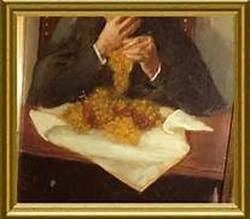 I always wonder about the origin of stories such as this one. The characters could just as easily be Jewish ones, so feel free to substitute characters to suit your tradition...or not. But first, a word from our sponsor.  We have been offered a Matching Grant up to $1500 As of 12/5 only $1364 more to raise by 12/31! Please consider offering a tax deductible donation of $18 or more to support this project and the work of DC's Jewish Renewal community Minyan Oneg Shabbat. All proceeds go to providing us with rental space and the ability to dream a little bigger. We will be forever grape-ful. Thank you. Now here is this week's story. ººººººººººººººººººººººººººººº
One day, a countryman knocked hard on a monastery door. When the monk tending the gates opened up, he was given a magnificent bunch of grapes. "Brother, these are the finest grapes my vineyard has produced. I’ve come to offer them as a gift." "Thank you! I will take them to the Abbot immediately, he will be delighted with this offering." "No", responded the countryman, "I brought them for you. For whenever I knock on the door, it is you opens it. When I needed help because my crop was destroyed by drought, you gave me a piece of bread and a cup of wine every day." The monk slightly bowed his head, and the countryman went on his way. The monk held the cluster of grapes and spent the entire morning admiring it. In reflection, he decided to gift the grapes to the Abbot, for it was the Abbot who always encouraged him with words of wisdom. The Abbot was very pleased with the grapes, and admired their beauty for some time, taking in the color and the shapes. He then recalled that there was a sick brother in the monastery, and thought, “I’ll give him the grapes. Who knows, they may bring him some joy and healing.” And that is what he did. The sick monk was overjoyed, and thanked the Abbot for his generosity. He too was taken by the beauty of the grapes, and saw in them a magnificent work of art, with patterns of repeated themes and slightly variegated colors. He reflected: “The cook has looked after me for so long, feeding me only the best meals. I’m sure he will enjoy these.” The cook was amazed at the beauty of the grapes. He carefully arranged them in a large platter alongside other fruit for the evening meal, and while admiring them, he realized, "These grapes are perfect, so perfect that no one would appreciate them more than the sexton." Many at the monastery considered him a holy man, a mystic, and he would best value this marvel of nature. But the sexton, in turn, gave the grapes as a gift to the youngest novice, that he might understand that the work of G!d is in the smallest details of creation. And when the novice received them, he quietly recalled the first time he came to the monastery, hoping to be among a community of people who knew how to value the wonders of life. He pictured the person who had opened the gates for him. And so, just before nightfall, he took the grapes to the monk at the gate. "Eat and enjoy them", he said. You spend most of your time alone here, these grapes are most deservedly yours. The monk humbly bowed his head and accepted the grapes, as he understood that the gift had always been truly meant for him. He relished each of the grapes, before falling into a pleasant sleep. (Story re-crafted by R' Mark Novak, found here: http://academictips.org/blogs/the-circle-of-joy/ ººººººººººººººººººººººººººººº My late rebbe, R' Zalman Schachter-Shalomi, zt"l, (זכר צדיק לברכה) was a master storyteller. He taught, in the name of Abraham Joshua Heschel zt"l: "a mayse is a story in which the soul surprises the mind". "A Year of Stories" is dedicated to his memory. I invite you to forward the link to these stories so that they find their way into the hearts of other listeners and tellers. ∞∞∞∞∞∞∞∞∞∞∞∞∞∞∞∞∞ If you would like to be added to the growing list of "Year of Stories" followers, let me know at [email protected], with "Year of Stories" in the subject line. 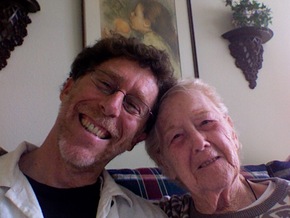 It is now 3 weeks post burial. My chest is a little less heavy, my gait a little freer from the weight of sadness. My beard is sorely in need of trimming, but when I look in the mirror, it doesn't matter, evidenced by the tears that still flow easily as I write this. Luckily, I am frequently in a setting where no one asks about my three weeks of facial hair, I am where everyone knows why my outward appearance is less socially presentable. I am in minyan. As we know, a minyan is necessary for the recitation of certain prayers, among them the mouner's kaddish, an opportunity to sanctify life, and my opportunity to help the return of my mother's soul to its source. Traditionally known as "kaddish yatom", I understand that term more acutely personal now. It is the "orphan's prayer", and I am now without both my mother and father. Reb Zalman would say that I now wear the "white beard". I am the elder. In an interview that she gave after her father died, singer Roseanne Cash shared that, no longer having a living parent, she now felt that "the last barrier between herself and her own mortality had been removed." That powerful insight remained with me, bookmarked for a future date, and was one of the first things that came to mind when my mother Elsie died. This past Sunday morning, as worship began, we only had 9 people. Those of us who were there to say Kaddish were keenly aware of the lack of a quorum to do so. On a weekday someone would have gone across the hall to ask one of the secretaries to join us. But on a Sunday, not so. When we reached the moment to say Kaddish d'Rabbanan, the leader called out a page number that signaled we were skipping Kaddish and moving on to the next section of the liturgy. Immediately, one of the women called out, "Wait, let me see if anyone is coming." The leader paused, and the woman left the room. Those of us remaining sat in silence, and waited - 1 - 2 - 3 - perhaps 5 minutes, before the woman returned with good news in the form of several additional people who were joining us. There was something about the quality of those minutes of silence that deeply resonated within me and between those of us who had sat quietly waiting. Time seemed to stand still. In the stillness I felt held by G!d and community. Reb Zalman teaches a possible understanding for ברוך שם כבוד מלכותו לעולם ועד to be "Your glory shines through time and space." Indeed, in the stillness the glory shined through - so true, so real, so effortless, so comforting. That evening, I returned to shul for Ma'ariv. One woman was saying kaddish for her father. It was her last day, after 11 months, that she needed to do so on a daily basis. She was clearly very emotional, and cried openly. She later shared that it was the anticipation she had about the "last day" that had shaken her. She thanked us all for our presence. I recalled the Kotzker Rebbe's gentle reminder that "there is nothing so whole as a broken heart". I also recognize that there is nothing so whole as a minyan. Ten adult Jews relying on each other's presence - to pray, to remember, to rebuild, to dream awake, and to hold each other in sacred community. 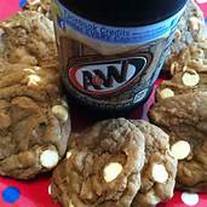 A little girl wanted to meet G!d. She knew it was a long trip to where G!d lived, so she packed her suitcase with chocolate chip cookies and a six pack of root beer and she started her journey. When she had gone about three blocks from her home she saw an old woman, sitting in the park staring blankly, or so it seemed, as some pigeons. The girl sat down next to her and opened her suitcase. She was about to take a drink from her root beer when she noticed that the old woman looked hungry, and the girl offered her a cookie. The old woman gratefully accepted it, and smiled at the girl. Her smile was so pleasant that the girl wanted to see it again, so she offered her a root beer. Again, the old woman smiled at her. The girl was delighted! And so it was, they sat there all afternoon eating and smiling, smiling and eating, never saying a word to each other. As it grew dark, the girl realized how late it was and she got up to leave, but before she had gone more than a few steps, she turned around, ran back to the old woman, and gave her a big hug. In turn, the old woman gave the girl her biggest smile ever. Filled with the warmth of that smile the girl ran home, and a short time later opened the door to her house. Her mother welcomed her home, surprised by the look of joy on the girl's face. She asked, "What did you do today that made you so happy?" She replied, "I had lunch with G!d." And before the mother could respond, she added, "And you know what? She's got the most beautiful smile I've ever seen." Meanwhile, the old woman, radiant with joy, returned to her home. Her son was stunned by the look of peace on her face and asked her, "Mom, what did you do today that made you so happy?" She replied, "I ate cookies in the park with G!d." And before her startled son could respond, she added, "And you know what, she's much younger than I expected." ººººººººººººººººººººººººººººº Please consider offering a tax deductible donation to support this project and the work of DC's Jewish Renewal community Minyan Oneg Shabbat. A shout out to Judy Young for her generous monthly support of this project. ººººººººººººººººººººººººººººº My late rebbe, R' Zalman Schachter-Shalomi, zt"l, (זכר צדיק לברכה) was a master storyteller. He taught, in the name of Abraham Joshua Heschel zt"l: "a mayse is a story in which the soul surprises the mind". "A Year of Stories" is dedicated to his memory. I invite you to forward the link to these stories so that they find their way into the hearts of other listeners and tellers. ∞∞∞∞∞∞∞∞∞∞∞∞∞∞∞∞∞ If you would like to be added to the growing list of "Year of Stories" followers, let me know at [email protected], with "Year of Stories" in the subject line. My mother did not live to see her 99th birthday, having died 2 weeks ago. Time of shloshim is already flying by. Here is a photo taken at a truly simcha-dik event. On December 18th 1966, my family celebrated two life cycle events: One was a party in honor of me having become bar mitzvah, the other was my sister's wedding. Yup, both on the same day! (Simcha Daniel, yes, I did sing "Vimale") My celebration had already been planned at Singer's Country Club in Spring Valley, NY. A few months prior my sister Ellen and her soon to be husband Bob announced their engagement, asked me if I didn't mind "sharing"my party, and the rest was history.
Pictured from right to left: my brother Franklin, now Ephraim; my brother in law Bob; my sister Ellen; my grandmother Annie: my mother Elsie, me, and my father Adolph. Here's a true fact - the names my parents were given at birth are not the names that anyone knew or called them by. Adolph was born Abraham, and Elsie was born Lena. My mother explained that all she knew was that her mother Annie had enrolled her in school by the name Elsie. No one remembers why my father became Adolph, yet another question I wish I had asked him while he was alive (my father died in 1990). I will always be left to wonder why, after the Second World War, he didn't use the name Abraham? One more thing about names. Sometimes my mother didn't call my father "Adolph". She called my father "Dudda". Why? My father was a twin, and my grandmother Sarah, who immigrated from Poland speaking Yiddish, could not fully pronounce the word "brother." So when she called out the window for the twins to come home, she would call "dudda...dudda". Happy birthday Mom - may your soul continue to ascend to its heavenly source. Your loving son, Marko Shmarko  There are times in which I see my work as a Mashpiah - Jewish spiritual director - in the last line of this story. Enjoy. ººººººººººººººººººººººººººººº Once there was a king who received a gift of two magnificent falcons from Arabia. They were peregrine falcons, the most beautiful birds he had ever seen. He gave the precious birds to his head falconer to be trained. Months passed and one day the head falconer informed the king that though one of the falcons was flying majestically, soaring high in the sky, the other bird had not moved from its branch since the day it had arrived. The king summoned healers and sorcerers from all the land to tend to the falcon, but no one could make the bird fly. He presented the task to the member of his court, but the next day, the king saw through the palace window that the bird had still not moved from its perch. Having tried everything else, the king thought to himself, "May be I need someone more familiar with the countryside to understand the nature of this problem." So he cried out to his court, "Go and get a farmer." In the morning, the king was thrilled to see the falcon soaring high above the palace gardens. He said to his court, "Bring me the doer of this miracle." The court quickly located the farmer, who came and stood before the king. The king asked him, "How did you make the falcon fly?" With his head bowed, the farmer said to the king, " It was very easy, your highness. I simply cut the branch where the bird was sitting." ººººººººººººººººººººººººººººº Please consider offering a tax deductible donation to support this project and the work of DC's Jewish Renewal community Minyan Oneg Shabbat. A shout out to Judy Young for her generous monthly support of this project. ººººººººººººººººººººººººººººº My late rebbe, R' Zalman Schachter-Shalomi, zt"l, (זכר צדיק לברכה) was a master storyteller. He taught, in the name of Abraham Joshua Heschel zt"l: "a mayse is a story in which the soul surprises the mind". "A Year of Stories" is dedicated to his memory. I invite you to forward the link to these stories so that they find their way into the hearts of other listeners and tellers. ∞∞∞∞∞∞∞∞∞∞∞∞∞∞∞∞∞ If you would like to be added to the growing list of "Year of Stories" followers, let me know at [email protected], with "Year of Stories" in the subject line. |
Mark Novak is a "free-range" rabbi who lives in Washington DC and works, well, just about everywhere. In 2012 he founded Minyan Oneg Shabbat, home to MOSH (Minyan Oneg Shabbat), MindfulMOSH (Jewish mindfulness gathering), and Archives
June 2017
Categories
All
|

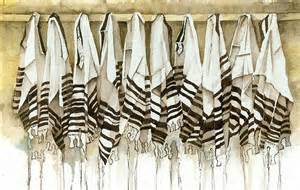
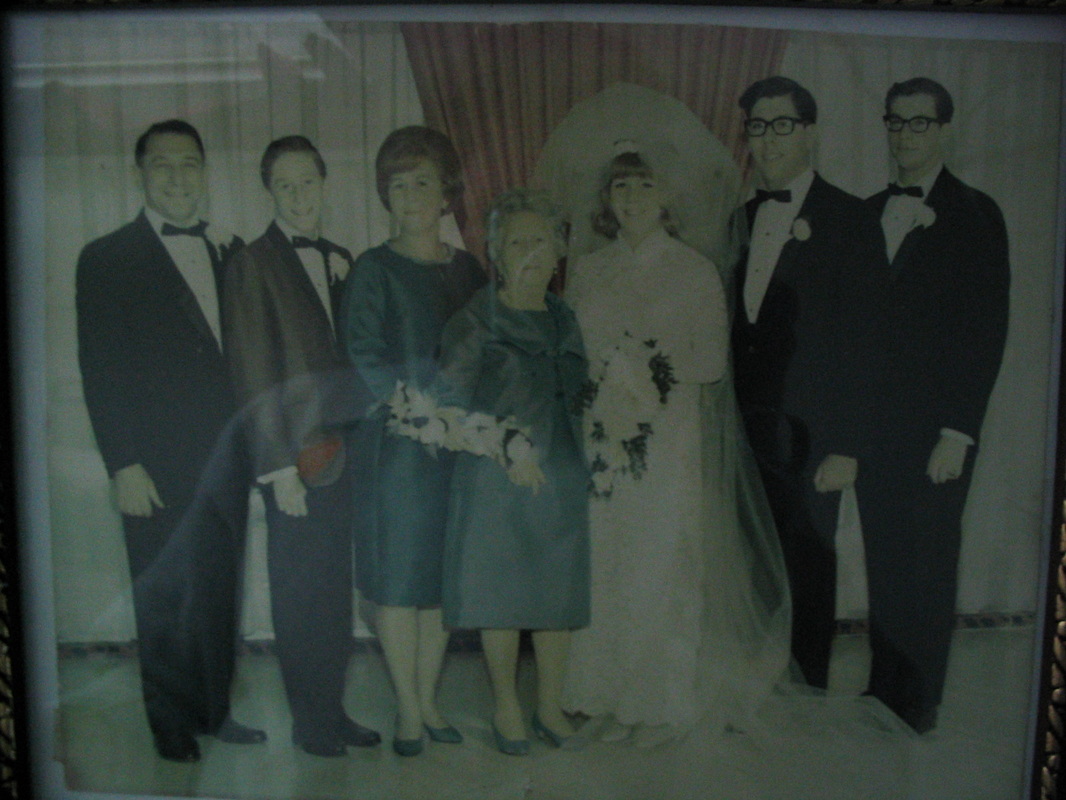
 RSS Feed
RSS Feed
